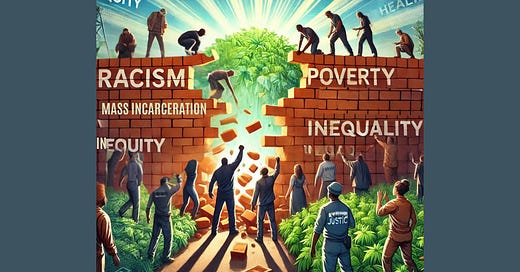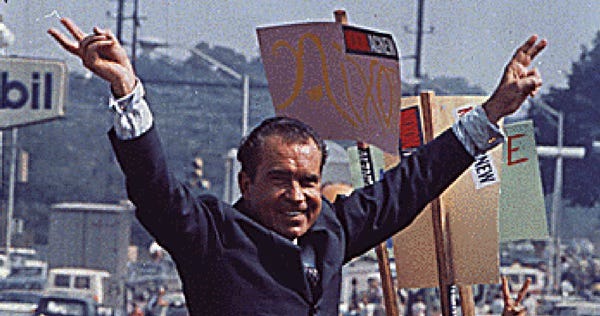"Alexa, play Another Brick in the Wall by Pink Floyd."
Pink Floyd’s iconic anthem rails against systems that dehumanize, control, and strip us of our individuality—what better soundtrack for the work of dismantling oppression? Just like in the song, the bricks in the wall aren’t just metaphors—they’re real systems of racism, criminalization, and inequality, built to divide and dehumanize.
But here’s the truth: systems built by people can be dismantled by people. Every time we challenge injustice, refuse to conform to oppressive narratives, and demand restorative justice, we’re taking a sledgehammer to that wall.
This article is about breaking down those bricks—not with destruction alone, but with the intention of building something new. Because on the other side of oppression is liberation, and together, we have the power to get there.
On Sunday night, President Joe Biden released a statement about his decision to pardon his son, Hunter Biden, stating:
"Today, I signed a pardon for my son Hunter. From the day I took office, I said I would not interfere with the Justice Department's decision-making, and I kept my word even as I have watched my son being selectively, and unfairly, prosecuted."
This statement reflects an undeniable truth: selective prosecution exists, and Hunter Biden’s case is a glaring example of how privilege shapes who receives justice and who doesn’t. While Hunter’s pardon underscores the importance of fairness and compassion, it simultaneously shines a harsh light on the systemic inequities embedded in our justice system—inequities that Joe Biden himself helped create with the 1994 Crime Bill.
This isn’t just about one person’s son. It’s about the hundreds of thousands of people, disproportionately Black, Brown, and poor, who were locked up for nonviolent drug offenses during the era of mass incarceration—a policy era Joe Biden helped define.
The War on Drugs: A Tool of Oppression
The War on Drugs, launched in the 1970s, was never truly about public safety. It was a political weapon designed to target Black communities and antiwar activists. Nixon's own domestic policy advisor, John Ehrlichman, admitted:
"We knew we couldn’t make it illegal to be either against the war or black, but by getting the public to associate the hippies with marijuana and blacks with heroin. And then criminalizing both heavily, we could disrupt those communities."
By the time Joe Biden co-authored the 1994 Crime Bill, the War on Drugs had already wreaked havoc on Black and Brown neighborhoods. Biden’s legislation escalated the damage, creating harsher penalties, expanding mandatory minimums, and funneling billions of dollars into the prison industrial complex.
The result? An era of mass incarceration that destabilized entire communities. Politicians like Hillary Clinton dehumanized Black youth, labeling them “super-predators” (thanks, Hillary), while law enforcement tore through neighborhoods like an occupying force.
The Costs of Racism and Over-Policing
What lawmakers like Biden, Nixon, and Clinton didn’t realize—or most likely ignored—was that oppression is never contained. Systems of oppression built to corral and criminalize Black communities inevitably expand, spreading harm to other marginalized groups, and eventually, the broader public.
Take over-policing as an example. Designed to disproportionately target Black people and enforce control over poor neighborhoods, it has now become a reality for middle-class white communities as well. Traffic stops, civil forfeiture, and militarized police tactics—once justified as tools to manage “urban crime”—are now affecting people who never imagined they’d be on the receiving end of such policies.
Similarly, the criminalization of poverty, which began with Black and poor white communities, is now reaching further up the socioeconomic ladder. The very laws created to punish the most vulnerable—anti-homeless ordinances, drug laws, and debt-based punishments—are increasingly being used against middle-class families in financial crises. Racism, far from being an isolated issue, sets the stage for oppression to metastasize and harm everyone.
If racism stops liberation, it also stops progress. It creates systems that are unsustainable, unjust, and ultimately dangerous for all.
Who Got Help, and Who Got Punished
Racism shaped not just who was targeted but how addiction was handled. Wealthy white families dealing with substance abuse found sympathy and treatment options, while poor whites were pushed aside, treated as "white trash" unworthy of support or dignity. Meanwhile, poor Black and Brown families were criminalized for addiction, painted as a menace to society, and warehoused in prisons.
The crack epidemic of the 1980s and 1990s laid bare these disparities. Addiction in Black communities was weaponized as proof of moral and social failure, justifying harsh prison sentences and the abandonment of entire neighborhoods. When opioid addiction later devastated poor white communities, those people were similarly disregarded. But for wealthy white families, addiction became a “public health crisis,” met with compassion, resources, and treatment.
This double standard reflects a failure to recognize addiction as a human issue, deserving of restorative justice—not punitive justice. Instead of criminalization, there should have been healing, rehabilitation, and investment in communities.
What Restorative Justice Could Look Like
Restorative justice means more than empty apologies or surface-level reforms. It requires systemic investment in healing and repair. Imagine a society where resources poured into over-policing are redirected into addiction recovery programs, community-based mental health services, and education. Where criminal records are automatically expunged for nonviolent drug offenses, and those affected by mass incarceration receive reparative support like housing assistance, job training, and trauma care.
Countries like Portugal have shown the success of decriminalizing drug possession and shifting to a health-focused approach. By prioritizing treatment over punishment, they’ve reduced addiction rates and crime while restoring dignity to affected communities. The U.S. could follow suit—not just as a reactionary policy, but as a deliberate act of reparative and restorative justice.
A Vision for True Justice
True justice doesn’t focus solely on punishment—it centers healing, accountability, and repair. Imagine a future where no child grows up in a neighborhood stripped of resources by a system that values incarceration over education. Where addiction is met with care instead of condemnation. Where the harm caused by policies like the 1994 Crime Bill is not only acknowledged but actively undone.
This is the future we must build. Not just for Hunter Biden, not just for the privileged, but for the countless lives impacted by systemic injustice. The question is not if President Biden can act—but if he will.
An Open Letter to President Biden
Dear President Biden,
I write to you as someone who has witnessed the devastating impacts of the 1994 Crime Bill and the War on Drugs on communities across this nation. Your decision to pardon your son, Hunter, for what you described as “selective and unfair prosecution” highlights the very disparities that define our justice system. While your son deserves compassion and fairness, I must ask: where is that same compassion for the millions of Black, Brown, and poor white individuals whose lives were upended by the policies you championed?
Black boys were dehumanized and labeled “super-predators” (thanks, Hillary), and poor white families were written off as “white trash,” both targeted by systems designed to criminalize poverty and addiction. The laws created to punish these groups have expanded, now harming middle-class families who were never meant to be caught in this web. This is what happens when systems of oppression are allowed to flourish—eventually, they harm everyone.
Your acknowledgment of “selective and unfair prosecution” in your son’s case is valid. But that acknowledgment cannot stop there. The same selective and unfair justice your son experienced has been endured by millions—disproportionately Black and Brown people—for decades, often with far worse consequences. Where is the justice for those incarcerated for nonviolent drug offenses, many of whom remain behind bars or burdened with criminal records, even as cannabis becomes a booming legal industry?
The 1994 Crime Bill, the War on Drugs, and the prioritization of punishment over healing destabilized entire communities. They stripped people of economic opportunities, tore families apart, and perpetuated cycles of poverty and incarceration. But, Mr. President, you have the power to begin repairing the harm:
Issue sweeping pardons for all nonviolent drug offenders.
Partner with Congress to expunge records and provide reparative support for those impacted.
Invest in the communities most harmed by these policies, funding education, housing, and trauma care instead of incarceration.
Take bold steps to dismantle the prison industrial complex and reimagine justice through a restorative lens.
Your legacy cannot be one of mere acknowledgment. It must be one of action. Compassion, fairness, and justice cannot only be reserved for those closest to us—they must be extended to all. If you can pardon your son, you can and must pardon the millions whose futures were stolen by the policies you helped create.
The time for justice is now. The time for reparative and restorative justice is now. Please, do not let this moment pass.
In solidarity and accountability,
Desireé B. Stephens
Educator | Counselor | Community Builder
Founder, Make Shi(f)t Happen
CTA: Send this Or Your Own Letter Online
You can submit your letter directly through the White House Contact Form:
Visit the official White House website: https://www.whitehouse.gov/contact/
Fill in the form with your personal details.
Copy and paste this or your letter into the "Message" section or upload it as a document if the option is available.
Final Thoughts
If we are to build a society rooted in equity, we must dismantle the systems of oppression that perpetuate harm—and that begins with recognizing a fundamental truth: racism doesn’t just harm those it targets directly. It creates systems of inequality and control that inevitably spill over, damaging us all.
President Biden, you have the power to set a new course—one rooted in restorative justice, reparative action, and the liberation of all people. The time to act is now.
But we, too, hold power. As a nation, we have the power to demand these changes. We have the power to challenge the narratives that justify oppression. We have the power to hold our leaders accountable and to organize within our communities, dismantling harmful systems and building new ones rooted in healing, equity, and liberation.
True justice isn’t punitive—it’s restorative. It acknowledges harm and prioritizes healing. It addresses the root causes of inequality and ensures that no one is left behind. If we can envision this future together, we can build it together.
President Biden, you have the opportunity to lead this movement. People of this nation, you have the power to drive it. The time to act is now.
In solidarity and accountability,
Desireé B. Stephens
Educator | Counselor | Community Builder
Founder, Make Shi(f)t Happen






Always love your newsletters! You share education on large, complex issues in succinct, in-depth ways that I truly enjoy. I'll definitely be referencing your work while talking about systemic issues with folks who haven't yet received much political education beyond what our oligarch-picked politicians share on the political theater.
Thank you, thank you for your eloquent and informative words. Though I saw this happening, in my work as a therapist and educator, I was not able to fully process and understand this and similar issues as deeply as I do after learning from you 💜